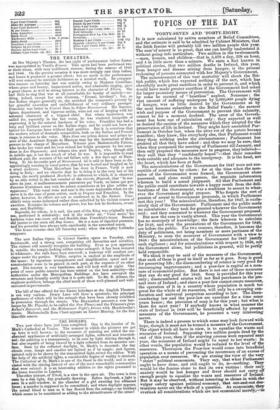THE THEATRES.
At Her Majesty's Theatre, the last night of performance before Easter was appropriated to Verdi's Ernani. This opera had been performed two or three times, with very indifferent success, during the seasons of 1845 and 1846. On the present occasion it was more strongly cast than before, and hence it produced a greater effect; but no merit in the performance will ever conceal its intrinsic feebleness as a musical work. Its compara- tive success on Saturday last was mainly owing to Madame Casten= ; whose grace and beauty, impassioned action, and admirable singing, gave a great charm as well as strong interest to the character of Elvira. She had little to sing that was at all remarkable for beauty of melody—no- thing, indeed, except her aria d'intrata, " Ernani, involami"; but, as fine Italian singers generally do, she enriched the composer's poverty by her graceful execution and embellishment of very ordinary passages. Fraschini was better in Ernani than in Edgar Ravenswood. His features, figure, deportment, and vigorous action, were not out of keeping with his assumed character of a brigand chief. But where tenderness was called for, especially in the last scene, he was rendered incapable of expressing it by the natural hardness of his voice. Fraschini has had a long and brilliant career on the Italian stage, and he could not have at- tained his European fame without high qualities. But it is notorious that the modern school of dramatic composition, both on the Italian and French stage, is ruinous to the voice. More than one prima donna and primo te- nore of the Academie Royale de Musique may lay the destruction of their powers to the charge of Meyerbeer. Witness poor Mademoiselle Falcon, who broke her voice and for ever ruined her bright prospects by her exer- tions in Lea Huguenots; and witness also poor Duprez, who, though still in middle age, is but the wreck of what he was. It is impossible to read without pain the account of his sad failure only a few days ago at Ham- burg. In his favourite part of Ravenswood, he is said to have been so dis- appointingly wanting in vocal power, that he was hooted and laughed at, by a cruel audience. What Meyerbeer has done in France, Verdi is now doing in Italy; and we observe that he is doing it in the very last of his operas, the newly produced Macbeth; in reference to which, it is observed by an able writer in the last number of the Gazette Musicale, that "la ma- niere du jour, si malhenreusement patronisde par Verdi, ne laisse que pen d'annees d'existence anx voix les mieux constitudes et les plus solides en apparence." This vocal wear and tear is the more deplorable when we ob- serve it in the case of great artists, such as Duprez and Fraschini. In the latter, however, its effects are not so confirmed as in the former. Fres- c.hini's voice seems indurated rather than enfeebled by his violent course of exertion. It retains its volume and power, but has lost its freshness, sweet- ness, and flexibility.
Superelii, for whom, it is said, the part of the King was originally writ- ten, performed it admirably; and in the tender air, " Vieni meco," his baritone voice was more soft and flexible than Fraschini's tenor. Bouchd did justice to the stern old Rag Gomez. He is a man of dignified presence, and his powerful bass always tells excellently in the concerted music. The house remains shut till Saturday next; when the mighty Lablache reappears.


































 Previous page
Previous page